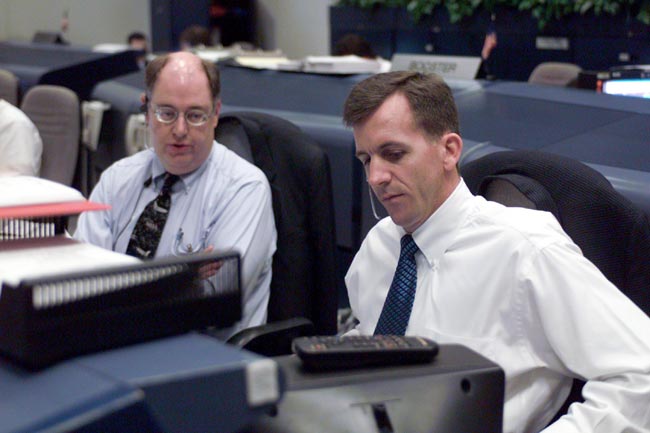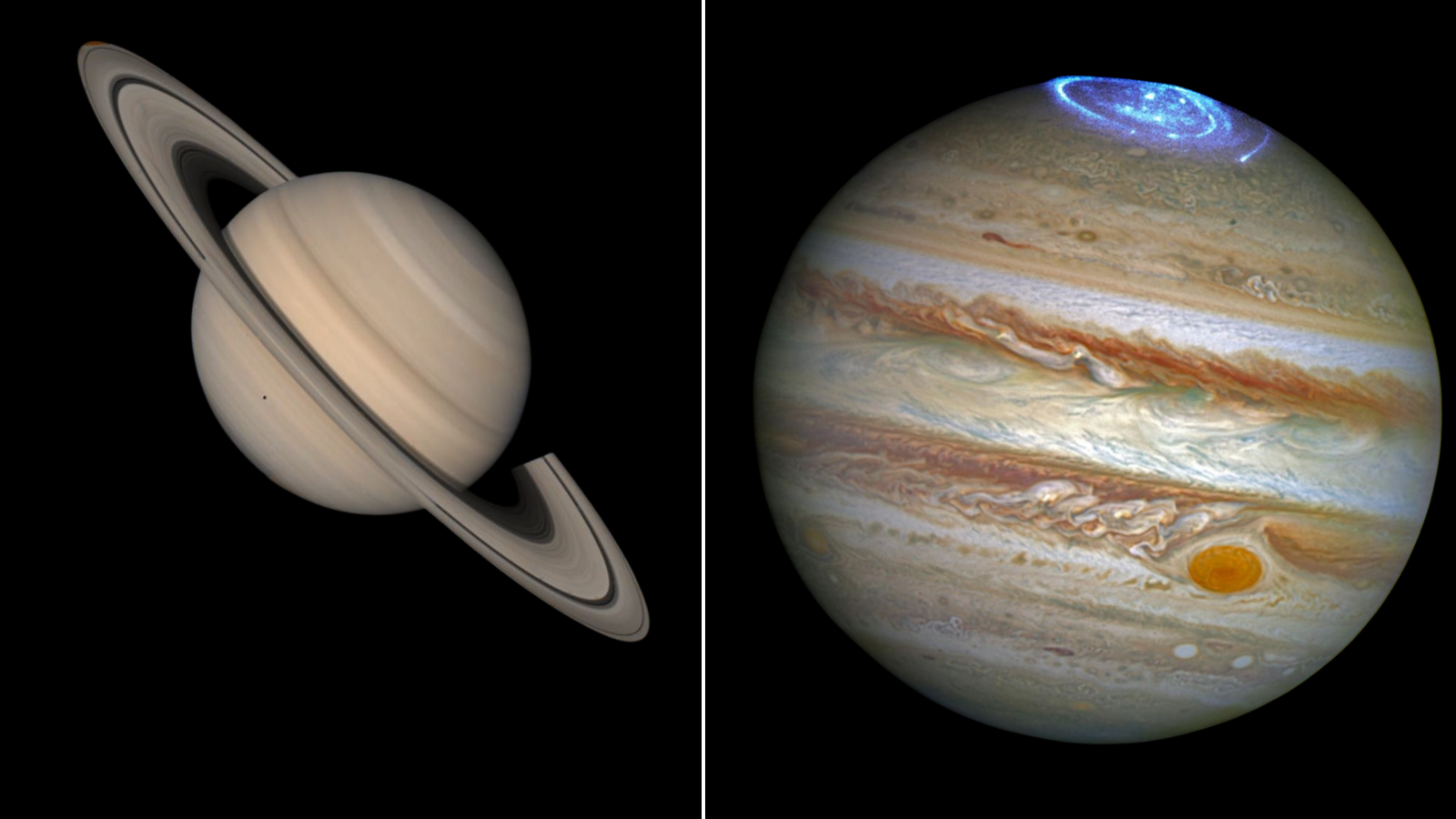NASA's Procedures, Culture Under Fire: Striving for Accountability

Thisstory is Chapter 5 in an 11-part series by Florida Today.
Wayne Hale was 3 the daySputnik's beep penetrated Americans' psyche. Forty-seven years later, Hale,deputy manager of the space shuttle program, doesn't remember any of it. Buthis mother never forgot.
The Hale home buzzed withthe same breathless dinner-table chatter heard in hundreds of thousands ofhomes across the United States that October night in 1957: What might theSoviet Union do with the little metal ball they now had circling the globe? Spyon us? Drop bombs from space on our military bases and our cities? Take overthe world?
The little boy, accordingto his mother's story, listened intently and was never the same. Wayne Hale wasa space cadet.
Clovis, N.M., adust-encrusted town west of the Texas border, might be in the middle ofnowhere, but it was close enough to the space craze to turn a boy's curiosityto obsession. Robert Goddard and Wernher von Braun tested early Americanrockets at an Army range two hours west. The Apollo program later tested thecrew escape systems there. Roswell sightings of secret test craft kept tales ofspaceships and aliens hot in the news.
By the time Houston becamehome base for the campaign to land men on the moon, Hale was bent on finishingschool, moving to Texas and finding work in the space program.
But Hale was a realist. Heknew the thick eyeglasses he'd worn since boyhood would stop him from being anastronaut. Hale studied hard and picked Rice University because it was close bythe Manned Spaceflight Center in Houston.
Breaking space news, the latest updates on rocket launches, skywatching events and more!
When NASA would not givehim a job fresh out of college, he chased a master's degree at PurdueUniversity because of its reputation for churning out astronauts and missilemen.
It was the late 1970s. NASAwon a hard-fought battle to get money for a reusable space shuttle that couldcarry people and cargo to orbit and then glide to an airplane-style landing ona runway.
After graduation, Halelanded a dream job in Mission Control, on a team of experts on shuttlethrusters. He spent eight years learning in that group, which included somebright young stars of the new shuttle program.
Together, they made historyflying the world's first reusable spaceships, and then went their separate waysto promising careers.
Hale ultimately became"Flight," standing at the helm of the Mission Control Center,orchestrating more shuttle missions than anyone else ever has.
That's why he says heshould have done things differently when everything was on the line.
JOHNSON SPACE CENTER:Request for spy photos denied by management
The images zipped fromKennedy Space Center across the country in the days after the Jan. 16, 2003,launch of Columbia.
Hale saw them while tyingup loose ends before leaving Houston to take a new job at KSC. Something hitColumbia's wing, disintegrating into white powder, while the ship rocketed upat about twice the speed of sound.
The assumptions: The whitestuff was a piece of super-light foam insulation from the external tank; therewould be damage to repair, nothing else.
Not everyone agreed.
Some wanted moreinformation than they could get from the fuzzy pictures taken by the groundcameras at the Cape.
No problem, Hale thought.He had top-secret security clearance. He knew the military could aim some ofits classified spy satellites at the shuttle and snap some clearer images.
After two requests fromcolleagues, Hale made a call, and the Air Force sprung into action to getpictures.
Somewhere in NASA,engineers and managers made two similar requests. But the orders were madeoutside NASA's chain of command and, in a wave of confusion, mission managerLinda Ham nixed the pictures, saying NASA didn't want or need them.
Maybe it didn't matter.
Ham might have been right:Even if the pictures showed dramatic damage, there was nothing anyone could do.But after the accident, stories subtly cast Hale as an antagonist pressing Hamto act.
"Some people thinkWayne was a hero in this," Hale said. "That is far from the truth.Please do not portray me as some kind of hero trying to do somethingextraordinary. I played a role in this. All of us involved in this effort haveregrets."
In the end, the frustratedColumbia Accident Investigation Board blamed bureaucratic bungling and poorcommunication for many "missed opportunities" by managers to getsatellite pictures or do anything to try to give the crew a better chanceinstead of letting Columbia make a doomed attempt to land.
The CAIB report, NASArecords and the people involved still don't tell who, if anyone, objecteddirectly to Ham. The reasons remain as foggy as the story of what happened. AllHale says is: "I have regrets."
NEW ORLEANS AIRPORT: Acall between flights prompts change of job
Six months after theaccident, Hale split time between KSC and his wife and home in Houston whilehelping with the accident probe.
Belinda hadn't moved toFlorida yet. They hadn't put the house in Friendswood, a few miles from JohnsonSpace Center, on the market.
They were empty-nesters.Son Joshua was in the seminary and about to be married. Daughter Elissa wasstudying English at a private college out of state. Belinda didn't really wantto go to Florida after living so long in suburban Houston.
Scurrying through the NewOrleans airport on a flight home to Houston, Hale flipped on his cell phone andchecked voice mail. One message. "It's Bill Parsons. Give me a call."
A few minutes to sparebefore his next flight, Hale dialed the new manager of the shuttle program.
"I need you to be mydeputy," Parsons said.
Hale paused a bit,stuttered and accepted the job without portraying his astonishment.
"I wassurprised," Hale said. "I didn't even know I was being considered forthat kind of job."
HOUSTON: New deputyshakes up system, demands change
Despite being back in Texas,Hale wasn't spending as much time at home as he might like. There was littletime for socializing with friends from church, or doing much of anythingoutside his small office at Johnson Space Center. Still, he was home.
"Our kids think wedon't have a social life," Hale said.
Hale set out quickly on thework of being deputy manager of the shuttle program, a job with littledefinition when dreamed up but one that ended up entailing some of the mostchallenging reforms needed to safely return the shuttles to space.
Among his orders: ChangeNASA's culture; revitalize a safety system so gutted during the 1990s thatinvestigators said "there was no 'there' there"; encourage people toovercome fears and speak up to top managers; wipe away years of ingrained apathywhen requirements loosened and managers often let cost and schedule pressureguide decisions.
Rules for mission managerschanged. Never again would top managers be out of town during a flight. Norwould the Mission Management Team take a weekend off, with a crew in harm'sway, instead of meeting every day as required by the flight rules.
Hale set up practicesessions where engineers and managers alike were tossed fake problems in anenvironment where he demanded they raise concerns rather than keep quiet.
"I wake up everymorning with a shiver, saying we've got to do this right and what can I dopersonally to make sure we do the very best job," Hale said.
PASADENA, CALIF.: E-mailfrom KSC sets agenda, accountability
Being portrayed as a herostuck in Hale's craw. Then came the e-mail that pushed his buttons.
Hale was in California, atthe Jet Propulsion Laboratory, watching flight controllers hoot, holler andhigh-five as the second of two robot rovers successfully bounced onto Mars.
The scene was inspiring.Hale was there to see how these people managed to pull off not one, but twolandings on Mars on a short schedule packed with risk.
He drove back to his hotelthe morning of the Mars landings, thinking about all that had happened duringthe past 12 months. It was almost one year since the accident.
A few weeks before,President Bush had made the speech the space community dreamed of: a clear,direct mandate to send humans deeper into space. They were going to the moon,then Mars.
Hale started typing a messageto the troops, discussing the stakes ahead.
The president had entrustedthem with a vision to spend billions of dollars to finish the space station,build new spaceships, and send humans to the moon and Mars.
Keeping that fragile dreamalive meant perfection. They would bet the space program every time they litthe shuttle's solid rocket boosters.
It took Hale days to getthe memo just right. Before he sent it, he recalled that nagging e-mail fromsome guy at KSC. He added a P.S.
"A final, personal note,"Hale typed. "A worker at KSC told me that they haven't heard any NASAmanagers admit to being at fault for the loss of Columbia. I cannot speak forothers, but let me set my record straight: I am at fault.
"If you need ascapegoat, start with me. I had the opportunity and the information and Ifailed to make use of it. I don't know what an inquest or a court of law wouldsay, but I stand condemned in the court of my own conscience to be guilty ofnot preventing the Columbia disaster.
"We could discuss theparticulars: inattention, incompetence, distraction, lack of conviction, lackof understanding, a lack of backbone, laziness.
"The bottom line isthat I failed to understand what I was being told; I failed to stand up and becounted. Therefore look no further; I am guilty of allowing Columbia to crash.
"As you considercontinuing in this program, or any other high-risk program, weigh the cost.You, too, could be convicted in the court of your conscience if you are everparty to cutting corners, believing something life and death is not yourresponsibility, or simply not paying attention. The penalty is heavy; you cannever completely repay it."
Publishedunder license from FLORIDA TODAY. Copyright ? 2005 FLORIDA TODAY. No portion of this material may be reproduced in anyway without the written consent of FLORIDA TODAY.
FloridaToday Special Report: NASA's Return to Shuttle Flight
Fixing NASA: Complete Coverage ofSpace Shuttle Return to Flight
John Kelly is the director of data journalism for ABC-owned TV stations at Walt Disney Television. An investigative reporter and data journalist, John covered space exploration, NASA and aerospace as a reporter for Florida Today for 11 years, four of those on the Space Reporter beat. John earned a journalism degree from the University of Kentucky and wrote for the Shelbyville News and Associated Press before joining Florida Today's space team. In 2013, John joined the data investigation team at USA Today and became director of data journalism there in 2018 before joining Disney in 2019. John is a two-time winner of the Edward R. Murrow award in 2020 and 2021, won a Goldsmith Prize for Investigative Reporting in 2020 and was a finalist for the Pulitzer Prize in Investigative Reporting in 2017. You can follow John on Twitter.
